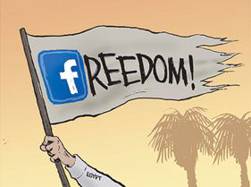
The 1991 Gulf War ushered in a new era of reporting on conflict, as 24-hour news pioneer CNN brought real-time video of faraway battles into living rooms around the world for the first time.
The 'CNN Effect' was coined as scholars and policymakers engaged with what this direct access means for public awareness, policymaker concern, and the need to 'Do Something' when we are global witnesses to conflict, disaster, and atrocity.
Two decades later, the proliferation of 'new media' sources like Twitter, Facebook, Youtube and other direct-to-access sources means that anyone with a smartphone and courage can become a war reporter, crumbling the barriers between 'established' and 'alternative' media.
We today receive news about the events at Tahrir Square, the street demonstrations and combats in Syria, the courageous Pakistani activist Malala and the protests against the Mohamed movie from multiple sources.
However, these new technologies can be double-edged, both in the ways they are used and the effects they have: witness for example the overnight global uprising for, then blowback against, and finally the ephemerality of the Kony2012 video.
Dr. Piers Robinson is a Senior Lecturer at the University of Manchester (UK), focusing on the relationship between communications, media and world politics. His early work focused on the CNN effect and the relationship between news media, foreign policy and humanitarian intervention and his book The CNN Effect: the myth of news, foreign policy and intervention (Routledge, 2002) is the most widely cited work on this topic. His current research interests include media and war, leading a ESRC project exploring media coverage of the 2003 Iraq invasion. He is an editor of the journal Critical Studies on Terrorism (Routledge), and editor of a special issue of the journal Media, War and Conflict on the CNN effect published in 2011, among many relevant recent publications.
Dr. Eytan Gilboa is Director of the School of Communication and the Center for International Communication at Bar-Ilan University in Israel. He is a renowned expert on international communication, media, and US Policy in the Middle East. He has published several books and numerous articles on media and conflict, including Media and International Conflict (2006) and Media and Conflict: Framing Issues, Policy Making, Shaping Opinions (2002). In 2002 he won the Shorenstein Fellowship and was a Senior Research Fellow at the Kennedy School of Government at Harvard University. He has been editor, producer and moderator of current affairs and documentary programs, has served as a consultant to the Israeli Prime Minister Office and the ministries of Foreign Affairs and Defense, and was Academic Director of International Studies at the National Defense College of the Israeli Defense Forces.
Tine Ustad Figenschou is a Postdoctoral Fellow at the Department of Media and Communication, University of Oslo. Her work focuses on Al-Jazeera and Al-Jazeera English, including engaging with varied perspectives on media and conflict. Some recent publications include: “The South is Talking Back: With a White Face and a British Accent – Editorial Dilemmas in Al Jazeera English” (2012), "Content: The Message of AJE's News" (2012), and “Suffering Up Close: The Strategic Construction of Mediated Suffering on Al Jazeera English”.
Ivar A. Iversen, foreign policy editor at Dagsavisen, will chair the event.





